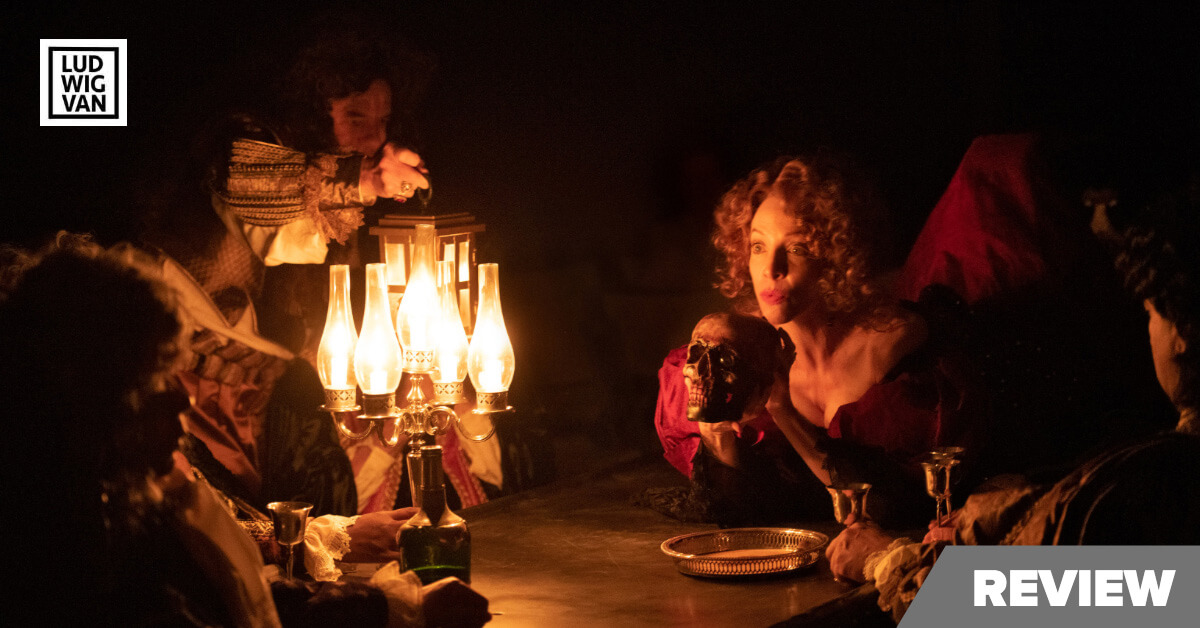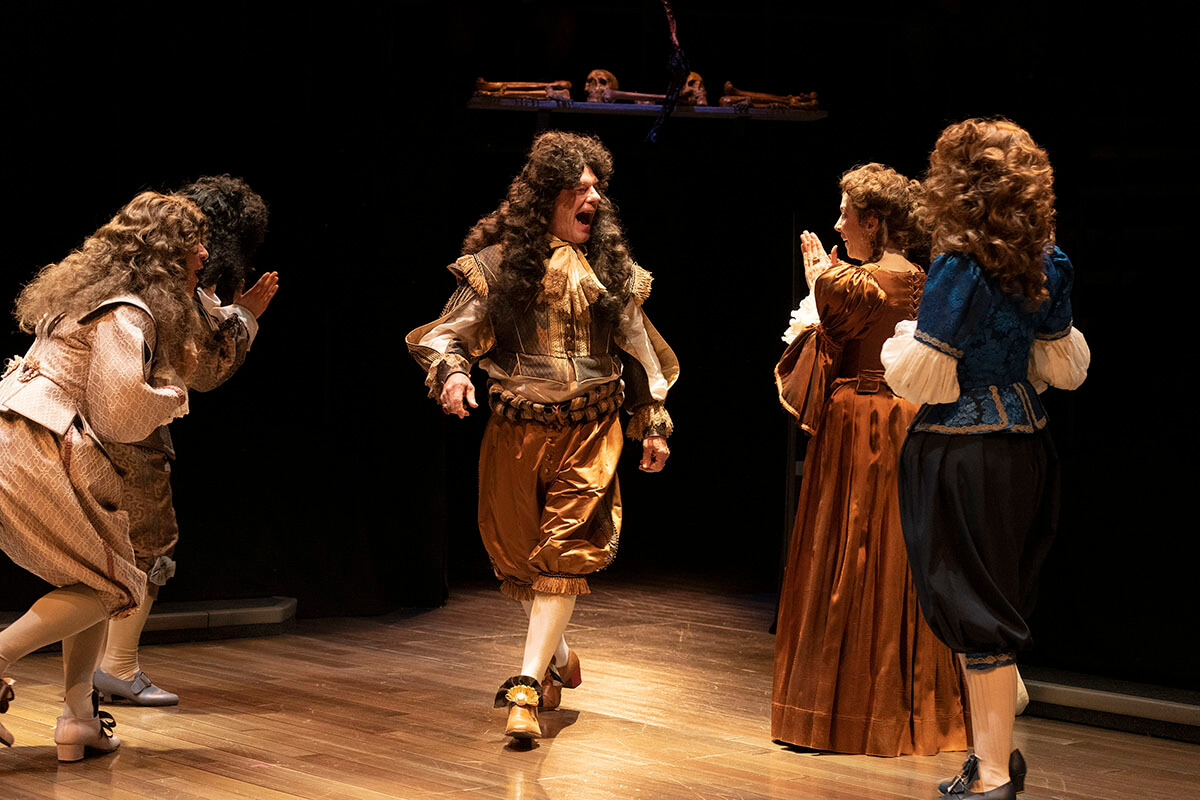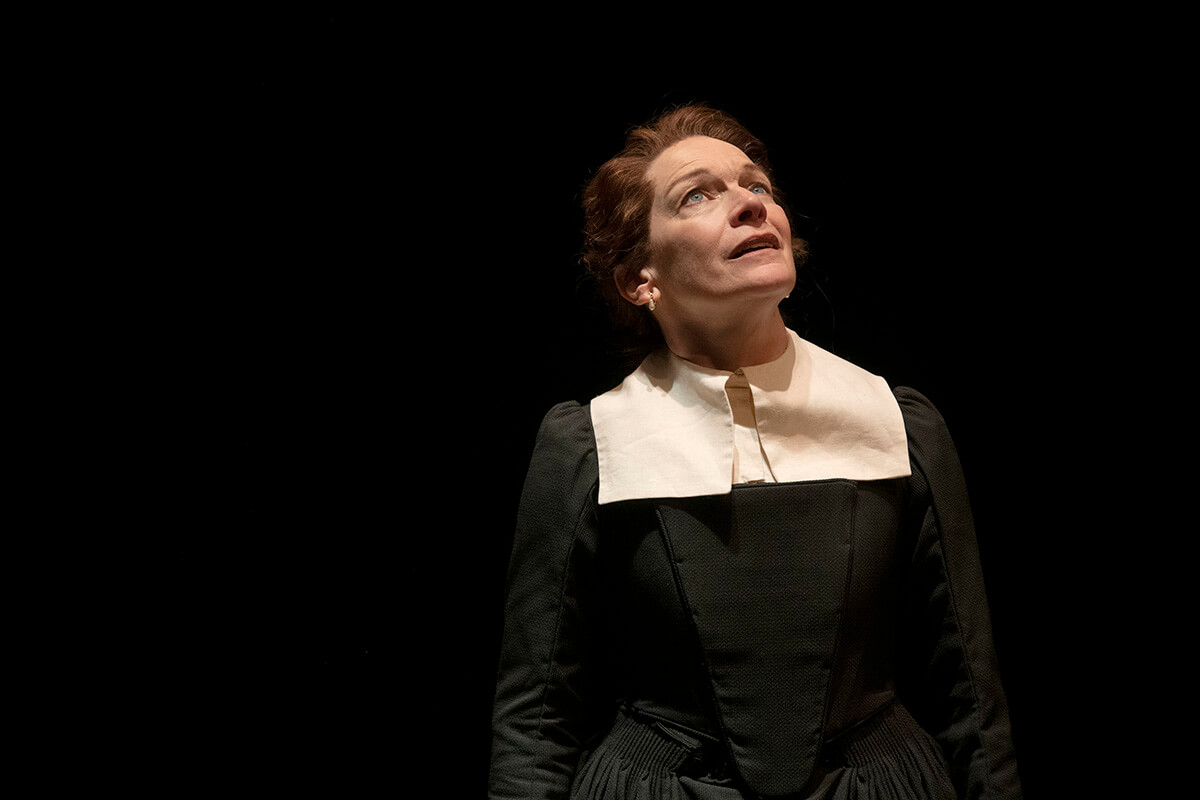
Shaw Festival 2019/ Victory: Choices in Reaction by Howard Barker, directed by Tim Carroll, Jackie Maxwell Studio Theatre, Jul. 14 to Oct. 12. Tickets available at shawfest.com.
The 1983 play Victory: Choices in Reaction opens with actor Deborah Hay, in the gender-bending role of a cavalier dandy, overseeing workmen exhuming a body. In his irritation at the slowness of the procedure, he says: “I have commanded some cunts, but you take the cunt biscuit.” Welcome to the world of prolific British playwright Howard Barker and his self-named Theatre of Catastrophe. No matter what adjective you use to describe Victory — be it challenging, controversial, impenetrable, provoking, inflammatory, offensive, obscene — the word doesn’t even come close to describing the heart of darkness that is the Barker theatrical experience.
Barker has always been more popular outside The Five (the world’s major English-speaking countries). The continental Europeans, for example, have been more open to his complex, enigmatic, opaque, ambiguous and poetic style. Barker, who is also a prolific essayist on theatre, refuses to call himself a playwright, declaring that the word smells of a marketplace where a product (the play) is expected. He has also stated that “theatre is too important to be used for social improvement”. Rather, he is a dramatist who writes “moral speculations” on a “morally evacuated universe”. He considers himself a tragedian, tragedy being “the greatest of all art forms” where we encounter “the forbidden and undeclared”, and where pain is the dominant factor. This does not rule out, however, the sardonic humour that permeates his canon of works.
His Theatre of Catastrophe has its own language that is raw, brutal, immediate, and peppered with four-letter words because Barker’s characters say what they mean. Fuelled by emotion and instinct, they are open in expression. Common throughout Barker’s plays are themes of violence, sexuality, power, and the motivation which drives these concepts. His characters must grapple with contradictions and paradoxes that stoke their inner turmoil. As a dramatist, he is providing the food for thought that the audience is to take away and chew on, so to speak. (And by the way, in the program notes written by Barker, he declares that Victory is an acknowledged masterpiece.)
Victory has been described as one of Barker’s plays that speculates on human behaviour in moments of historical crisis. The setting is Restoration England, following the return of the monarchy with Charles II in 1660, after the failure of Oliver Cromwell’s Commonwealth republic. Restoration drama flowered with the re-opening of the theatres that had been closed during the Puritan regime and included women actors on stage for the first time. The Restoration period is marked by the witty, salacious, immoral and sex-obsessed comedy of manners by Congreve, Wycherley, Etherege, and even women writers like Aphra Behn, the so-called “fornication plays”. On the serious side of things are the heroic verse drama tragedies in classical mode by the likes of John Dryden, William Davenant and Thomas Otway. I can certainly see that Barker’s Victory embraces both these aspects of Restoration drama in terms of form and structure.

The driving force that led up to the years of civil war and the execution of Charles I in 1649 was the struggle over who should rule Britain, manifested on one side by the rights of Parliament and the people, versus the monarchy and the Divine Right of Kings. When Charles II was restored in 1660, it was the beginning of the road to a constitutional monarchy. He had only one condition, apparently, in taking the kingship, and that was that the full weight of the law be brought against the fifty-six men who had signed his father’s death warrant, the so-called regicides. They were to be hanged, drawn and quartered, with their bodies (or pieces thereof) put on public display — but here’s the catch — whether dead or alive. It is this gruesome dictum that is the wellspring of Victory.
Bradshaw (Martha Burns) is the widow of John Bradshaw, the Lord President of the High Court of Justice and the first signatory on the royal death warrant. After his body is exhumed and “executed”, Bradshaw begins her quest to give her husband a proper burial, which brings this Puritan wife into a direct collision with the bawdy, hedonistic and licentious court of the Merry Monarch himself, Charles II (Tom McCamus). Other key figures are Scrope (Patrick Galligan), the former secretary of the High Court and Bradshaw’s self-imposed travelling companion, Ball (Tom Rooney), a dissolute cavalier who is determined to take Bradshaw’s Puritan virtue by any means, and Devonshire (Sara Topham), one of Charles’ many mistresses who becomes a protector of Bradshaw.
Hambro (Gray Powell) is an interesting character because he is a banker who also happens to be a Royalist. Nonetheless, he represents the interests of Parliament by keeping Charles in financial check. In one astonishing scene, the entire audience moves from the Maxwell Theatre to a downstairs rehearsal hall representing the vaults of the Bank of England, lit only by candles and lanterns. In this shadowy gloom, Hambro and his council refuse to give Charles the gold housed in the bank when the king and his entourage arrive at the vaults. Clearly, true power rests with the money.
In the play we also meet Bradshaw’s adult children, her opportunistic son McConochie, a surgeon (Michael Man) and her pragmatic daughter Cropper (Kiera Sangster), Nell Gwynn (Deborah Hay) and Cleveland (Shauna Thompson), two more of Charles’ mistresses, Nodd (Emily Lukasik), Charles’ cockney friend and valet, and Clegg (Sanjay Talwar), England’s poet laureate. Cast members play many other characters as well. For example, McCamus also doubles as the disgraced Republican poet John Milton who had been a civil servant during the Commonwealth. Led by the excellent Burns, this very strong ensemble delivers finely detailed performances under Carroll’s intelligent and economical direction. Rachel Forbes’s elaborate costumes are period-perfect, while Claudio Vena’s electronica/baroque sound design conveys the relentless forces at work in the world.

What faint storyline there is follows Bradshaw’s journey. Basically, the play is made up of short scenes focusing on encounters between the various characters. Over time, one becomes aware of just how complicated Barker’s people are. For example, Charles is bored and restless, which in turn makes him cruel, demanding and petulant. His pursuit of pleasure is a deliberate cover-up of his innate and under-used intelligence. Scrope is tortured with guilt over his revealing the secret grave of John Bradshaw to Royalist forces, yet he, a staunch Puritan, demands that Bradshaw’s widow grant him sexual favours. Hypocrisy is writ large throughout Victory.
Another factor in the mix is Margaret Thatcher’s Britain (1979-1990), at its height when the play was written in 1983. Just how much of her Conservative party’s freewheeling capitalism and destruction of the unions was on Barker’s mind? There is a scene where we see the plight of peasants who had suffered under the Commonwealth just as much as they had under the first Charles, and were continuing to suffer under the second. Which begs the question: just what has been lost, and what has been restored for each of the characters?
If anyone were to ask me how best to approach this difficult play, it would be to look to Barker’s subtitle for Victory: Choices in Reaction. What do people do during a time of historical crisis? What decisions do they make? If we see the actions of the characters as a by-product of reaction, the play’s intent becomes less obscure. Bradshaw’s reaction to the dismemberment of her husband is to gather the pieces of his body. Charles’ reaction to finding himself on the throne is to demand vengeance against the regicides. Ball’s reaction to being in the Royalist political ascendancy is to humiliate Puritans. And on, and on it goes, with each subsequent decision leading to new choices, all of which have an impact on others, thus creating a chain reaction of consequences.
For me, the ironic title Victory stands for one word, and that is survival. Baker’s speculation on human behaviour in moments of historical crisis reveals the constant existential struggle of human existence. What victories there are, are dubious at best. Victory: Choices in Reaction is a risky play to put on any playbill, and kudos to Tim Carroll, Shaw’s artistic director, for taking the chance.
And a word to Howard Barker, I’m not sure Victory is a masterpiece, but it sure as hell makes for compelling theatre.
LUDWIG VAN TORONTO
Want more updates on classical music and opera news and reviews? Follow us on Facebook, Instagram or Twitter for all the latest.



